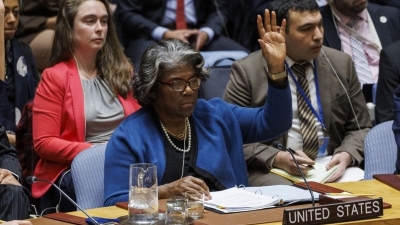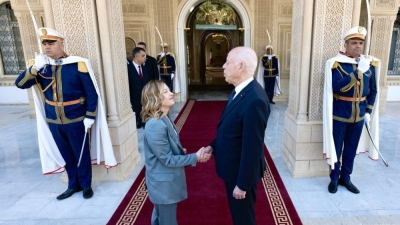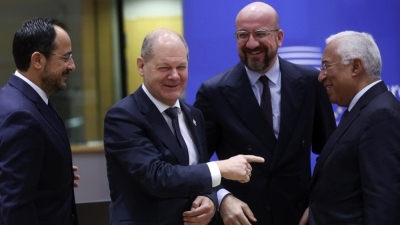EU strikes deal on renewable energy law, agrees 42.5% target by 2030

Agreement on the EU’s renewable energy directive brings to a close an 18-month process to upgrade the bloc’s climate policies and achieve a 55% net reduction in greenhouse gas emissions by 2030.
EU legislators reached an agreement on the renewables law in the early hours of Thursday (30 March) after a long night of negotiations which started at 16.00 CET the day before.
The political deal reached by the European Parliament, the EU’s executive Commission and EU member states includes a legally-binding target to “raise the share of renewable energy in the EU’s overall energy consumption to 42.5% by 2030,” according to a statement released after the talks.
EU countries that choose to do so can complement this target with “an additional 2.5% indicative top-up that would allow reaching 45%,” the statement adds.
“I’m glad we made it,” said Markus Pieper, a German conservative lawmaker who led the European Parliament’s delegation in the three-way talks.
“We will not only increase the share of renewables to 42.5% but also substantially fasten authorisation and permit-granting processes for renewable energy facilities. This is a good day for Europe’s energy transition,” Pieper said.
The deal closes negotiations on the main elements of the EU’s ‘Fit for 55’ climate package tabled in July 2021, which seeks to achieve a 55% net reduction in greenhouse gas emissions by 2030.
Before it becomes law, the political deal must still be formally ratified by the EU’s two co-legislators – the European Parliament and the Council of the EU representing the bloc’s 27 member states. This is usually a formality.
Meeting halfway on the 2030 target
EU negotiators were at odds over the bloc’s level of ambition on renewables.
After Russia’s invasion of Ukraine last year, the Commission had proposed raising the EU’s 2030 renewable energy objective from 40 to 45%, a position that Parliament overwhelmingly supported in a September vote.
Speeding up the deployment of renewables is “a key component of our agenda to phase out Russian fossil fuels” and isolate Moscow, the EU’s energy commissioner Kadri Simson told the bloc’s 27 energy ministers in December.
But EU member states were unconvinced and could only find a majority to back the 40% target tabled by Brussels the year before.
Backed by other central and east European countries, Poland called on the EU to stick with the 40% target. But others like Denmark, Germany, and Spain supported the 45% target and brought eight EU countries on board.
In the end, they met halfway – at 42.5%.

45% renewables target ‘is ambitious but feasible’, says EU climate chief
The European Commission defended its proposal to source 45% of the EU’s energy from renewable sources by 2030 as EU countries look to lower ambition, EU climate chief Frans Timmermans told EURACTIV in an exclusive interview.
Recognition for nuclear
A dispute over the role of nuclear energy in meeting the bloc’s decarbonisation goals threatened to derail the negotiations before legislators entered the talks on Wednesday.
Hours before they met, EU countries were still at odds over whether to recognise hydrogen produced from low-carbon nuclear power under the bloc’s renewable fuel targets for transport and industry.
France, backed by at least eight other EU countries, was leading a push for “low-carbon hydrogen” to be deducted from the bloc’s renewable goals, a move staunchly resisted by a rival group of at least nine other EU countries, including Germany.
In the end, the provisional agreement gives member states the possibility to choose between two objectives when it comes to renewable transport fuels, the statement said:
- a binding target of 14.5% reduction of greenhouse gas intensity in transport from the use of renewables by 2030;
- or a binding target of at least 29% share of renewables within the final consumption of energy in the transport sector by 2030.
The greenhouse gas intensity goal is a concession to countries like France, which already has a low-carbon electricity mix thanks to its fleet of 56 nuclear reactors.
According to Canfin, the political deal “recognises the specific role of nuclear power, which is neither green nor a fossil fuel”.
For industry, the deal mandates a 1.6% annual increase in the use of renewable energies by 2030. In addition, 42% of industry’s use of hydrogen should come from renewable fuels by 2030 and 60% by 2035, the EU statement says, with possible derogations foreseen for countries that already meet their decarbonisation goals – another win for France and its low-carbon electricity mix.

Nuclear vs renewables: Two camps clash in Brussels
EU energy ministers were divided into two camps at the EU Council meeting on Tuesday (28 March): the pro-nuclear alliance, which includes France and 10 other member states, and the “renewable friendly” group, composed of 10 EU states.



